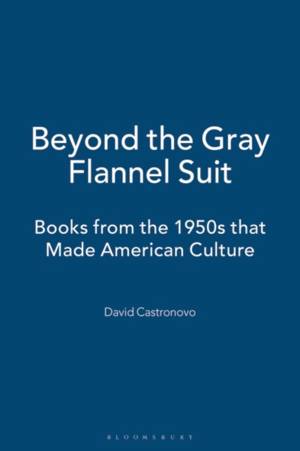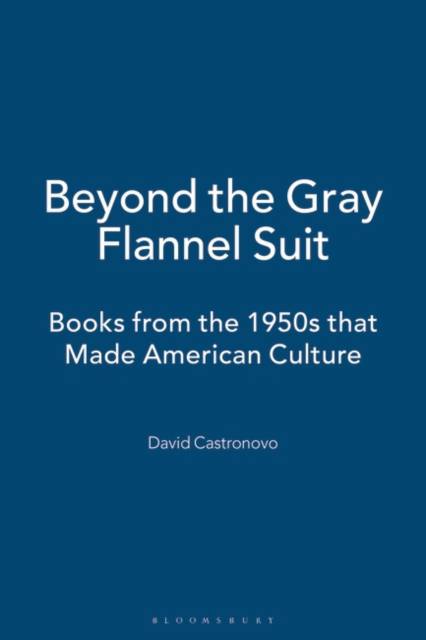
- Afhalen na 1 uur in een winkel met voorraad
- Gratis thuislevering in België vanaf € 30
- Ruim aanbod met 7 miljoen producten
- Afhalen na 1 uur in een winkel met voorraad
- Gratis thuislevering in België vanaf € 30
- Ruim aanbod met 7 miljoen producten
Zoeken
Beyond the Gray Flannel Suit
Books from the 1950s that Made American Culture
David Castronovo
Paperback | Engels
€ 61,45
+ 122 punten
Omschrijving
This examination and celebration of the literature and thought of the 1950s throws the enduring works of a golden era into high relief. An unconventional tour of a crucial period in 20th-century culture, the present book avoids sweeping surveys and gets to the heart of major achievement.
After the great renaissance of the 1920s and early 1930s, American modernism seemed to be stalled, to be awaiting another burst of talent. The post-World War II period provided that new energy and genius, with book after book that broke through the ordinary realistic atmosphere of bestseller lists, and offered experimentation, arresting content, and transformation of old literary forms.
In short, from the late 1940s through the JFK years, America was the home office of literary innovation. Writers forged new styles with the rapidly changing times, and generated new ideas that fit the challenges of late modernity.
Beyond the Gray Flannel Suit shows how particular landmark books took on the hot-button subjects of the 1950s-race and religious difference; social class and the suburbs; the youth culture; rebellion, conformity, and groupthink; the telling conflicts over taste and judgment-and how, in the process, whether we realize it or not, this body of super-charged literature shaped today's American culture.
After the great renaissance of the 1920s and early 1930s, American modernism seemed to be stalled, to be awaiting another burst of talent. The post-World War II period provided that new energy and genius, with book after book that broke through the ordinary realistic atmosphere of bestseller lists, and offered experimentation, arresting content, and transformation of old literary forms.
In short, from the late 1940s through the JFK years, America was the home office of literary innovation. Writers forged new styles with the rapidly changing times, and generated new ideas that fit the challenges of late modernity.
Beyond the Gray Flannel Suit shows how particular landmark books took on the hot-button subjects of the 1950s-race and religious difference; social class and the suburbs; the youth culture; rebellion, conformity, and groupthink; the telling conflicts over taste and judgment-and how, in the process, whether we realize it or not, this body of super-charged literature shaped today's American culture.
Specificaties
Betrokkenen
- Auteur(s):
- Uitgeverij:
Inhoud
- Aantal bladzijden:
- 208
- Taal:
- Engels
Eigenschappen
- Productcode (EAN):
- 9780826417664
- Verschijningsdatum:
- 1/09/2004
- Uitvoering:
- Paperback
- Formaat:
- Trade paperback (VS)
- Afmetingen:
- 141 mm x 208 mm
- Gewicht:
- 244 g

Alleen bij Standaard Boekhandel
+ 122 punten op je klantenkaart van Standaard Boekhandel
Beoordelingen
We publiceren alleen reviews die voldoen aan de voorwaarden voor reviews. Bekijk onze voorwaarden voor reviews.







